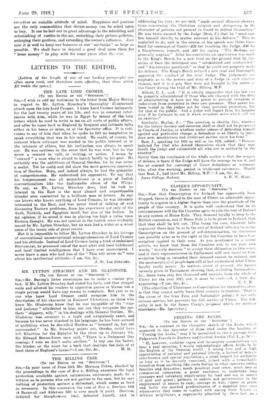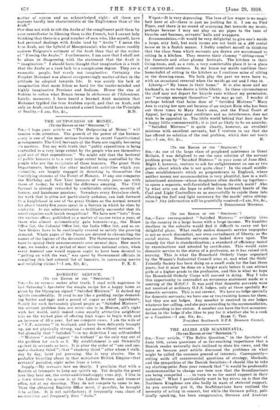FREEING THE ARABS.
(To TUE EDITOR OF THE SPECTATOR...)
SIR,—As a contrast to the character sketch of the Arabs which appeared in the Spectator of June 22nd under the heading of " Freeing the Arabs," may I be permitted to cite a passage Irma Palgrave's Travels in Eastern and Central .4 ra bin (Vol. I., p. 70) If, however, suchlike vague and incomplete assimilations can bear a real meaning, I would unhesitatingly affirm Arabs to be the English of the Oriental world. A strong love and a high appreciation of national and personal liberty, a hatred of minute interference and special regulations, a great respect for authority so long as it be decently exercised, joined with a remarkable freeedom from anything like caste feeling in what concerns ruling families and dynasties; much practical good sense. much love of commercial enterprise, a great. readiness to undertake long journeys and voluntary expatriation by land and sea in search of gain and power; patience to endure and perseverance iu the employment of means to ends, courage in war, vigour in peace, and lastly the marked predominance of a superior race over whomsoever they come in contact with among their Asiatic 4!1' African neighbours, a superiority admitted by these lust as a
matter of course and an acknowledged right : all these are features hardly less characteristic of the Englishman than of the A rab."
One does not wish to rob the Arabs of the compliment paid them by your contributor in likening them to the French, but I cannot help thinking that there is a good number of men who, like myself, have had personal dealings with Arabs (and by " Arabs " I mean the true Arab, not the hybrid of Mesopotamia), who will more readily endorse Palgrave's estimate of the Arab than that of the writer sf " Freeing the Arabs." Furthermore, I am sure that I shall not be alone in disagreeing with the statement that the Arab is " imaginative." I should have thought that imagination is a trait that the Arabs as a race lack to a conspicuous degree. They are a romantic people, but surely not imaginative. Certainly the Prophet Mahomet was almost overpoweringly matter-of-fact in the attitude he adopted towards life. It was surely his lack of imagination that made Islam so hard for the tender-minded and highly imaginative Persians and Indians. Hence the rise of Sufiism to soften what Renan terms la secheresse de l'Islamisme. Lately, moreover, I have heard a learned Arab maintain that Mehemet typified the true Arabian esprit, and that an Arab, and only an Arab, could have invented a creed founded on the Principle



























 Previous page
Previous page